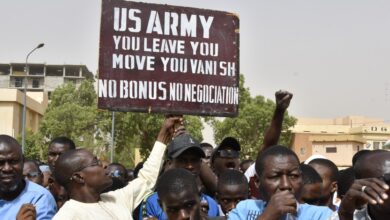Somalia expels Ethiopian ambassador amid Somaliland port deal dispute

Mogadishu also shuts down Addis Ababa’s consulates in Hargeisa and Garowe amid rising tension over a Somaliland port deal with Ethiopia.
Somalia has announced the expulsion of Ethiopia’s ambassador from the country amid rising tensions over a port deal dispute in the breakaway region of Somaliland.
Ethiopian Ambassador Mukhtar Mohamed was sent home for consultations, the office of Somalia’s prime minister said on Thursday. Mogadishu is also shutting down Ethiopia’s consulates in Hargeisa, the largest city and capital of Somaliland, and Garowe, the capital city of the semi-autonomous region of Puntland.
In a brief statement on X, Somalia’s Foreign Minister Ali Omar added that Mohamed has been given 72 hours to leave the country, following what he described as “Ethiopian interference” in Mogadishu’s “internal affairs”.
“Somalia stands firm on its sovereignty,” he wrote. “Our resolve in protecting our territory is steadfast.”
Al Jazeera’s Catherine Soi, reporting from the Kenyan capital, Nairobi, said the expulsion was a major diplomatic escalation.
“It appears that with what’s going on, it’s going to be a huge setback” in efforts to resolve the deal peacefully, Soi said.
The dispute arose after landlocked Ethiopia agreed on a memorandum of understanding on January 1 to lease 20km (12 miles) of coastline in Somaliland.
Under the deal, the coastland around the port of Berbera, on the Gulf of Aden, will be used by Ethiopia for 50 years for military and commercial purposes.
Ethiopia said it wanted to set up a naval base there and offered possible recognition of Somaliland in exchange, prompting defiance and anger from Somalia – which accused Ethiopia of trying to annex part of its territory – and fears the deal could further destabilise the Horn of Africa.
‘Landgrab’
Somalia claims Somaliland as its own territory, even though the northern region has enjoyed effective autonomy since 1991.
Somalia says the deal amounts to a landgrab, while Ethiopia says the deal is of a commercial nature and vital to its economic needs.
Somalia also felt that the Ethiopian government bypassed Mogadishu in reaching the deal, Al Jazeera’s Soi said.
Adding to the tension was Ethiopia’s recent meeting with officials from the semi-autonomous Puntland region of Somalia to discuss “bilateral” cooperation, she added.
In January, Somali President Hassan Sheikh Mohamud said in an exclusive interview with Al Jazeera that his country would “defend itself” if Ethiopia goes ahead with the deal.
Mohamud said Ethiopian assets would have to cross into Somalia’s territory to reach the leased area and warned Addis Ababa against taking such a step.
“So far Ethiopians haven’t come into Somalia. If they will, then that will be a problem at a different level,” Mohamud said.
He also accused Ethiopian Prime Minister Abiy Ahmed of having kept him “in the dark” about the deal with Somaliland when they met in Djibouti in late December for “very good” talks on the “unity” of Somalia, just days before the MoU was signed.
Asked whether he thought there could be a win-win solution to the crisis, which has stoked fears of a prolonged diplomatic rift, he said the ball was in Ethiopia’s court.
“We want Ethiopia to have access to the sea, there is no question about that,” Mohamud said, adding that the federal government was ready to negotiate a deal with Addis Ababa.
“But grabbing a piece of land, we are not ready for that.”
Read the full article here








